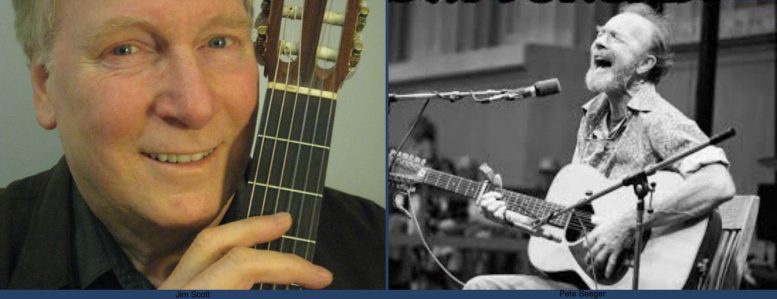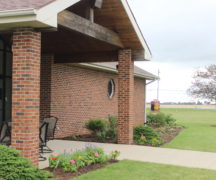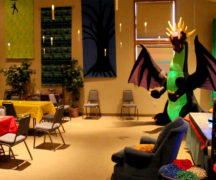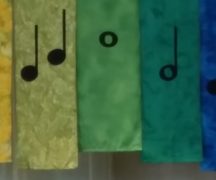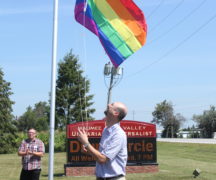By DAVID DUPONT
BG Independent News
For Jim Scott, any music can be seen as subversive. It doesn’t matter if its jazz, or folk, or even Protestant hymn tunes.
That’s never in doubt when he’s talking about the music of folk legend and activist Pete Seeger, who he counted as a friend as well as musical collaborator. “He was always there on the front lines in the peace movement and the labor movement,” Scott said. Later in life, Seeger dedicated himself to the successful efforts to clean up the Hudson River.
Scott, a guitarist, composer, and songwriter, will present the Pete Seeger 100th Birthday Songfest, Sunday, April 14, at 1 p.m. at the Maumee Valley Unitarian Universalist Congregation. He’ll also participate earlier in the day in the 11 a.m. service.
During the celebration, he’ll perform songs that Seeger wrote as well as songs he helped popularize. He’ll also include a few of his own compositions.
Scott said the songs will be interspersed with commentary on Seeger’s life and music.
Scott said his approach is inspired by Seeger. He’ll teach the songs by calling out the words for the next stanza. He’s not controlling the events. “I’m just inviting everyone to sing. We just talk about it like it’s the easiest thing.”
The commentary will be in the same spirit. “I’m just a guy, and this is what I learned.”
Before Seeger died in 2014, Scott asked his permission to do a song fest of his work. Seeger agreed. The setting was a workshop with a couple choirs. Scott printed out the words and music for a number of pieces. But seeing the singers looking at written music, he realized this was the wrong approach. Instead, he told them, “let me demonstrate the way Pete taught songs.”
Seeger, he said, wasn’t one for a lot fuss. “He just let people sing.”
Scott was a member of the Paul Winter Consort when he met Seeger in 1978. “I just crossed paths with him a lot of times,” Scott said. He visited Seeger at home in New York’s Hudson River Valley.
In conjunction with the Unitarian Universalist Green Sanctuary ministry, Scott assembled the “Earth & Spirit Songbook,” a collection of more than 100 songs. Seeger, he said, helped by suggesting songs and songwriters.
Collecting songs, as well as writing them, was important to Seeger. He performed the Cuban song “Guantanamera” in the 1960s when relations between Cuba and the United States had deteriorated.
He wanted people to sing it to remember that Cubans were human beings, Scott said. As with so many tunes he introduced, “Guantanamera” became a hit… for someone else.
When he was at the Highlander Folk Center in Tennessee, Seeger helped popularize the protest song “We Shall Overcome.”
The center was a training school for a who’s who of civil rights activists. Zilphia Horton, the wife of founder Myles Horton, had heard a version of the song sung by women striking at a cigarette factory. She brought it to the center where it was adopted and became an anthem of the movement.
Scott said Seeger pushed to have the song copyrighted the song in the name of the Highlander Center to keep it out of corporate hands.
Many songs were pieced together from different versions, with words married to different tunes. Scott said he’ll discuss the provenance of some of those. The emphasis, though, will be on the music.
“I’ve never quite figured out how I fit into a folk thing,” Scott, 73, said.
He studied classical guitar at the Eastman School of Music, and played jazz guitar in bars in Rochester, NY, where the school is located. This was during the Vietnam War.
He ended up playing with the Army’s Jazz Ambassadors big band. He also wrote arrangements for the ensemble. After that he continued his studies eventually earning a second bachelor’s degree in music from the Berklee College of Music in Boston. That school’s focus was on jazz and popular music.
Before he graduated he was recruited to work with Paul Winter. He co-wrote the ensemble’s master work the Missa Gaia, or Earth Mass. He was a regular member from 1977 to 1985, and continued performing with Winter off and on. His last show with the consort was in 2000 when the publication of the Missa Gaia was celebrated.
He’s collaborated with a variety of artists and leads his own jazz trio, which just released a new album.
A lot of his recent work has been with Unitarian Universalist congregations. A number of his pieces are in the hymn book.
“I do a little bit of anything,” he said of his performance schedule. “I’ll go anywhere they’ll have me.”

